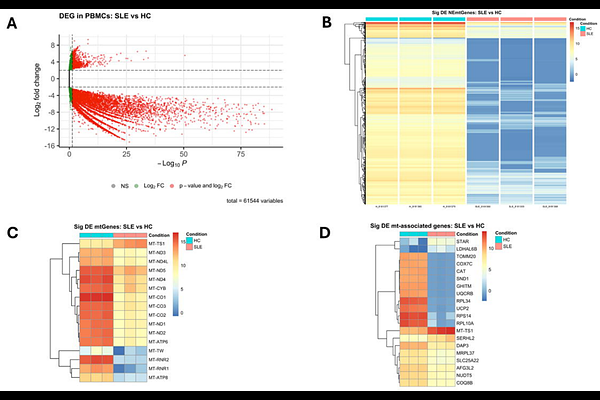Mitochondrial Bioenergetic Failure in SLE Immunocytes: Targeting Fitness for Therapy

Mitochondrial Bioenergetic Failure in SLE Immunocytes: Targeting Fitness for Therapy
Yennemadi, A. S.; Jordan, N.; Diong, S.; Little, M.; Keane, J.; Leisching, G.
AbstractBackground: Systemic Lupus Erythematosus (SLE) is characterized by dysregulated immune responses linked to immunometabolic perturbations. While mitochondrial dysfunction has been implicated in SLE, its cell-type-specific impact on immune subsets remains underexplored. Methods: We repurposed existing RNA-seq data from SLE patient peripheral blood mononuclear cells, with a focus on nuclear-encoded mitochondrial (NEmt) genes, as well as mitochondrial genes themselves, to identify differentially expressed genes compared to healthy controls. Mitochondrial stress tests were performed on freshly isolated CD4+ T cells, CD8+ T cells, B cells, and monocytes from SLE patients and healthy donors to assess bioenergetic function. Results: RNA-seq revealed that both NEmt genes and mitochondrial genes were downregulated in the PBMC population of SLE patients. In situ mitochondrial stress tests revealed significant reductions in oxygen consumption rate (OCR), indicating impaired oxidative phosphorylation (OXPHOS) across all immune subsets, while extracellular acidification rate (ECAR), a marker of glycolysis, remained unchanged. These findings highlight immune-cell-specific mitochondrial bioenergetic failure in SLE, without compensatory glycolytic adaptation. Conclusion: Our results position mitochondrial fitness as a novel therapeutic target in SLE. We propose leveraging high-throughput screening of mitochondria-targeted compounds, including FDA-approved agents, to enhance OXPHOS, regulate mitophagy, or mitigate oxidative stress. This precision-based approach offers a paradigm shift from conventional immunosuppression to metabolic recalibration, with the potential to restore immune homeostasis in SLE.